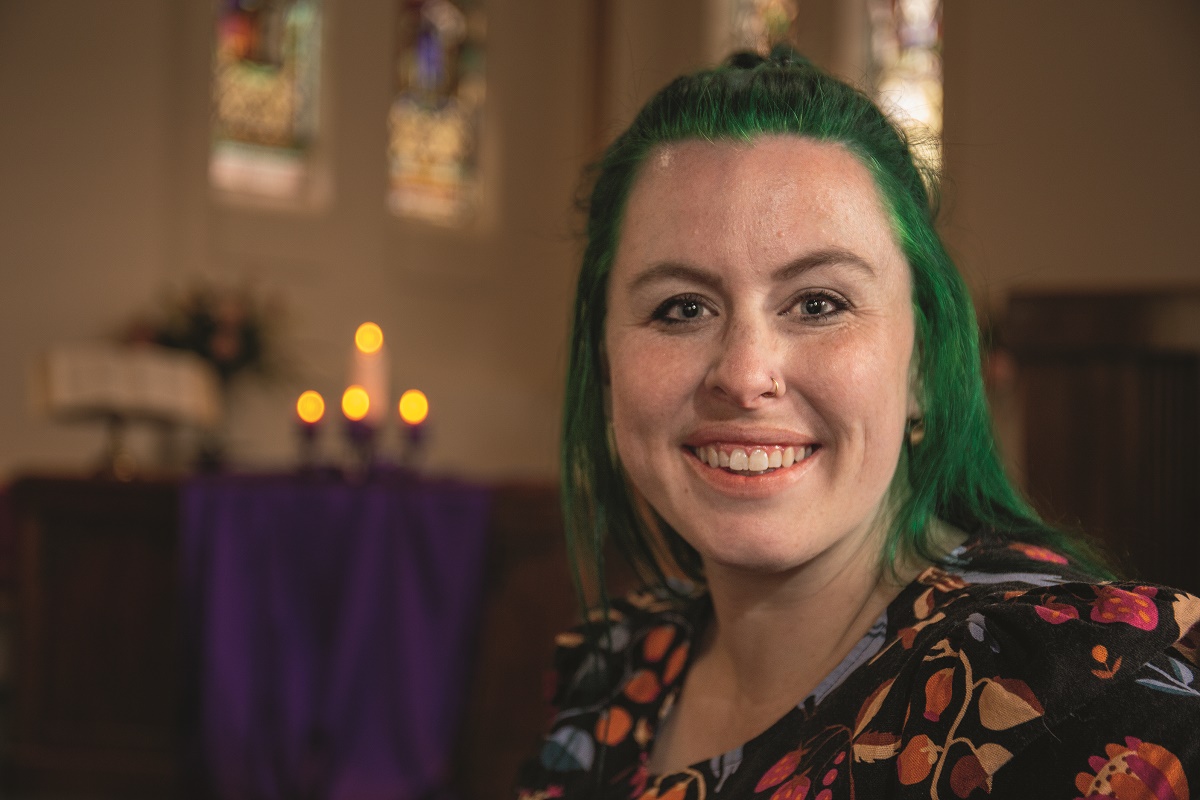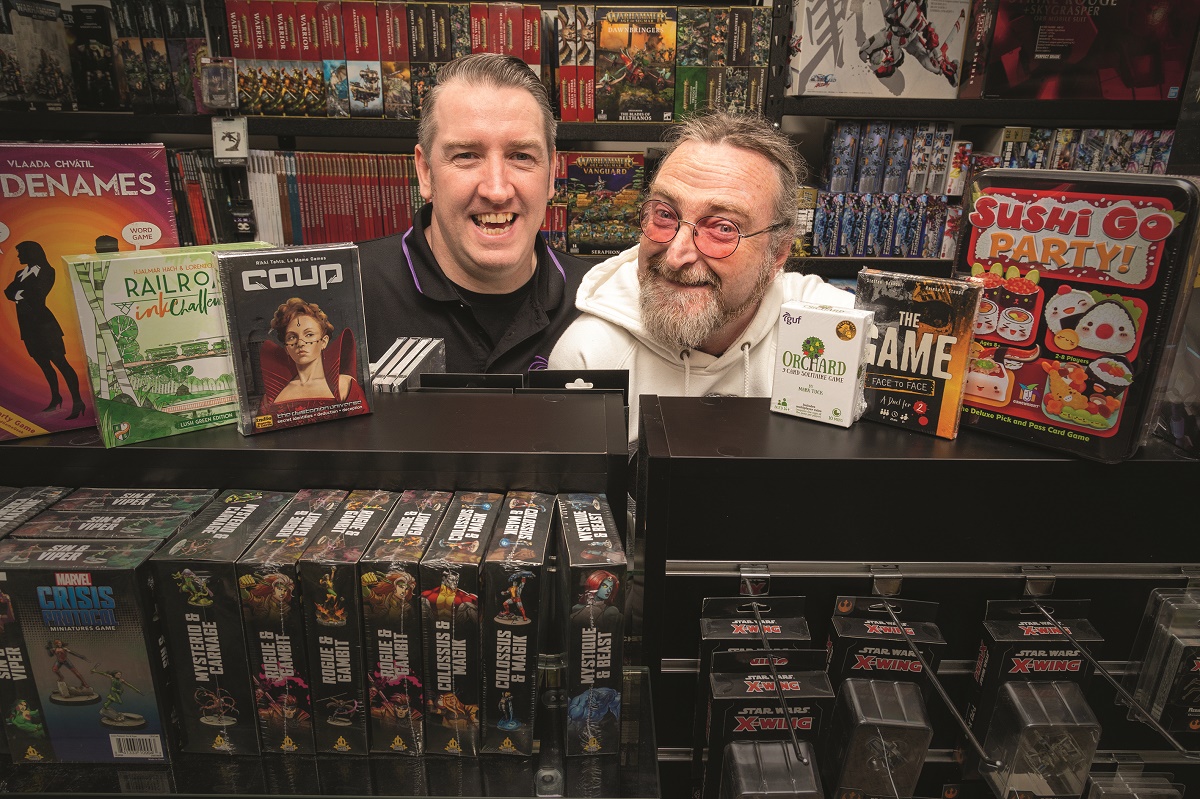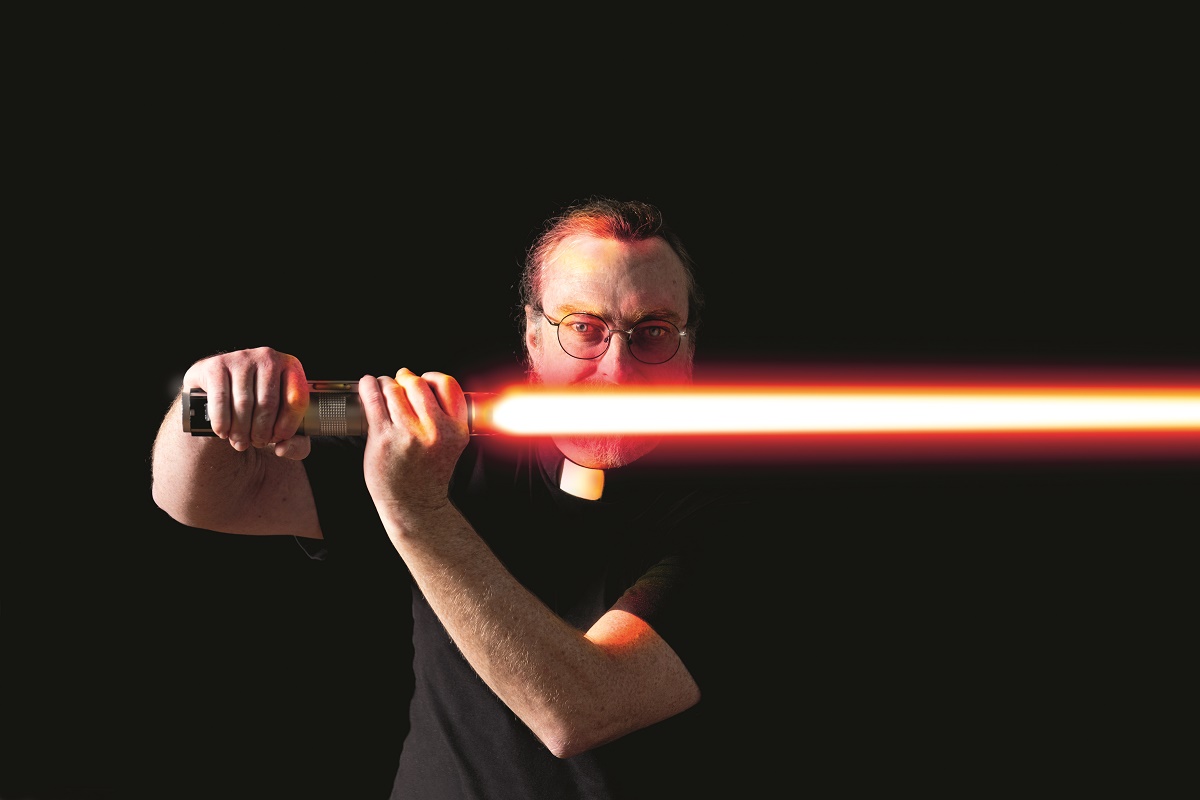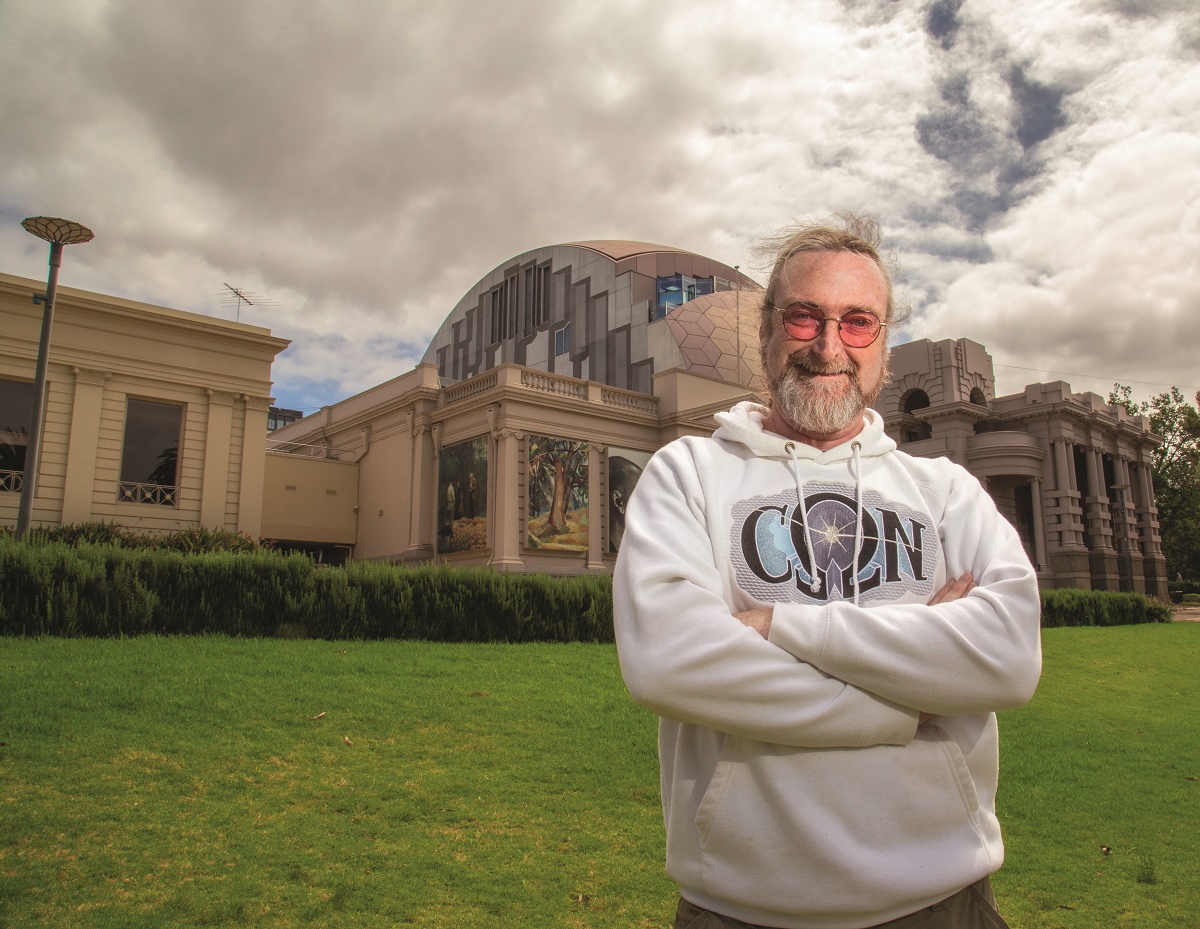By Andrew Humphries
When Uniting Church Minister Will Nicholas and St David’s Geelong congregation members sat down for their pre-Christmas lunch late last year, it was an afternoon of great fun and fellowship and a celebration of what being part of a church community is all about.
It was also an opportunity for Will to share one of his great passions with members of the congregation.
Since childhood, Will has been an avid gamer and, over time, that love of gaming has come to inform much of what he brings to the role of Minister.
He is quick to clarify, though, that it’s gaming based around board and tabletop games, as well as what can be explored in the digital sphere.
“Gaming is a very broad term and a lot of people misunderstand it,” Will explains.
“I’ve had to be very careful when I’m talking about gaming, and when I first came to St David’s it was spoken about that I was a gamer, and people thought it might have been in terms of horse racing and the pokies, that sort of gambling thing.
“It’s definitely nothing to do with that.
“People who are into gaming tend to talk about tabletop games, which actually brings in all of the different aspects of games that happen in a physical, geographic location, like cards, dice, board or pieces.
“That’s the tabletop game side of it, and the other side of it then is the digital side of it, and most people I come across who are into one are usually interested in the other.”
On the digital side of gaming, fellow Uniting Church member Kelly Skilton is leading the charge towards helping people realise the important and wonderful role it can play in further exploring their faith.
Part of that, she admits, involves shooting down a common misconception around gaming in general.
“If gaming isn’t something people are a part of naturally in their lived experience, then there’s an essence where it’s seen as frivolous,” Kelly says.
“But there is a part where the frivolousness isn’t what draws us to it, it’s the exploration of different ideas and thoughts and how far we can push concepts.”
Kelly’s fulltime role in the equipping Leadership for Mission unit in Parkville involves exploring what the digital space can bring to new, and younger, Uniting Church members.
For someone also passionate about gaming, it’s the perfect marriage of two great loves.
When embraced with an open mind, says Kelly, gaming can help to open up a world of endless possibilities in the exploration of faith.
“I think there’s an essence when we get to faith and spirituality, it’s thinking beyond what we just see and know, and gaming touches on those same neurological pathways,” she says.
“Because it’s touching on those same spaces it’s not a far reach that the board or digital game leads you into theological conversation, maybe you’re moving pieces and then, all of a sudden, you’re talking about Jesus’ resurrection.”

Kelly explores what the digital space can bring to new, and younger, Uniting Church members.
Like Kelly, Will says gaming often brings a new and different dimension to his faith journey, something that took him some time to feel comfortable about.
“I’ve always been interested in games and game play, but I had subconsciously kept myself as a gamer separate from myself as a Christian,” he says.
“In the 1980s, there was some hostility around linking role-playing games, but also a number of the other games, to being a Christian.
“So I guess I just grew up feeling that I couldn’t bring that part of myself into my faith, until my supervisor when I was studying at Deakin University challenged me to say ‘actually, this really does need to be integrated’.
“The narrative play that’s involved in theology is actually very similar to the narrative play that’s involved in a game, and it requires a suspension of belief to engage in a story, to move around in that story and to embody that story.
“And all of this became a bit of a lightbulb moment for me and it actually inspired me to start a website called ‘Never odd or even’, which actually has this simple advice that part of the idea of play is actually to be immersed in something that’s still ongoing and that can be replayed and reset.
“So the aspects of myself as a gamer and as a Christian are actually completely in sync with each other.
“It’s been a lot of fun and one of the things that I’ve been really pleased about is that at St David’s I have been given very broad permission to actually explore that side of myself as part of my ministry.
“Since I’ve kind of outed myself as a board gamer I’ve discovered so many other Ministers and church leaders who actually are secretly gaming.”
As the Uniting Church, and many other denominations, grapple with a decline in numbers, Will and Kelly believe gaming has the potential to unlock great riches for people new to faith.
In the digital sphere, Kelly loves interacting with other young Christians through ‘Sonderverse’, a space bringing people together as part of an online community.
“Sonderverse is a digital ecosystem where people can find community, regardless of where or when you may call a place home,” she says.
“We create a space for people to connect together, stream and game together, as well as explore faith and life questions.
“We are passionate about creating a safe and inclusive space for all people, no matter where they are in their spiritual journey.
“Sonderverse helps us to connect with people who might not be able to attend a board gaming place in a physical way, but are still able to connect in with a community.”
Will and Kelly are also part of a weekly online service on Twitch TV which has proven popular.
“Twitch offers the ability to connect within the gaming community, and so, because we are already on Twitch, we thought what would it be like to actually put on a service in this space, so if people aren’t going to walk into a church building, how do we connect them to where they’re at?” Kelly explains.
“So we decided to put a Sonderverse service on Twitch on Monday nights from 8pm and the response has been incredible.
“For example, someone in Canada came on to Twitch searching for an explanation on why they can’t hear the voice of God anymore?
“And we thought, ‘well, this is the space where people are going with questions like that’ and we need to be in that space they can reach.
“We actually realised there was a real community around Twitch, it’s not just people trying to fill space because they’re bored, they actually invest their time and don’t schedule anything else on because that’s their time when they come to this community.”

Will Nicholas with Guf owner Paul Telfer.
Will uses the example of a game called 10 Candles to illustrate how gaming can help to broaden the exploration of faith, and unlock what might previously have been hidden.
“I think one of the things that I’m particularly interested in when it comes to games and faith is that because of our reverence for our faith story, we tend not to play with it,” he says.
“In fact, as if it were a toy or a game, we’ve put our faith into a glass cabinet and we’ve made sure that it’s kept safe from everything, and we might stand and look at it as we walk past but the idea of actually playing with our faith and engaging with it in a first-hand way (doesn’t always happen).
“While I was in Tasmania we had a board gamers group and 10 Candles was a role-playing game we loved to play.
“It’s a game where 10 candles are lit and it’s designed to explore the concept of hope in the midst of hopelessness and as the team has success, or things go wrong and there are failures in achieving their goals, a candle is put out and, at the end of the night, there are no candles left.
“And in the darkness the group explores the journey they’ve taken.
“And so one year coming up to Easter, they said to me, ‘well if you’re a Minister, could you do the Easter story as a 10 candles role play, allowing the people who play to actually enter the story to make decisions that might not be canonical in decision making’.
“It was quite a profoundly moving experience to actually play with the Easter story in that way.”
So, where does someone start on the journey towards faith through gaming?
“I’d say start with the game that you like playing because it’s actually about enjoyment,” Kelly says.
“The idea of exploring who you are in this world can only be done if you are actually invested in it, and then you’ll find like-minded people.
“So put on a gaming event and invite some people along.
“By doing it this way, we found a group in Shepparton whose members are gaming, and one in Gippsland that wants to start gaming.
“And the fact is that we’ve been doing board games as part of youth group for years, so why not also bring it in as a part of Sunday morning worship?”
When he reflects on Christmas lunch with his St David’s congregation members, Will is grateful for the way they have embraced his love of gaming and, in turn, become comfortable in exploring it themselves.
“It takes a little while to bring some people around,” he admits.
“People are hesitant, especially older people, to try something new, but one of the things I’ve discovered about games is that there’s a social contract in the playing of them, whether they’re digital, board or tabletop games, where I have found that people with differing backgrounds, age or neurodiversity actually come to a table as equals.
So if everyone is learning a game for the first time, they are all learning what the social contract around that game is, and what the rules are and how to play.
“And so I think especially in the area of neurodiversity, I’ve seen people come along to a games night with a board game under their arm and suddenly have the keys to enter into the room of social engagement they may not have had previously.
“There is this sense that when we come to play a game together, we actually put the world and our position aside, and we adopt a place and a name and a role that might be entirely different to our normal ones.
“And often, when the game is the focus, there’s the opportunity to talk about so many other things in a way that’s not as confronting.
“But on top of that, there are just so many games that have a focus that actually deal with our space, spirituality and religious content.”

Will has been a Star Wars fan since the age of five.
The force is strong in Will
Coupled with Will Nicholas’ love of gaming is a twin passion for science fiction.
Call Will a “sci-fi freak” and he is happy to take it as a compliment.
And it’s all because of one of the most famous science fiction movies ever made.
In May 1977, director George Lucas’ ‘Star Wars’ (later renamed ‘Star Wars: A New Hope’) was released, the first of 11 Star Wars films that have thrilled millions of science fiction fans around the world.
That first Star Wars movie introduced us to Luke Skywalker, Princess Leia, Han Solo and his offsider Chewbacca, C-3PO, R2-D2 and, of course, the baddest of bad guys in Darth Vader.
Since that 1977 release, Star Wars has become its own franchise, expanding into more films and other media, including television series, video games, novels, comic books, and theme park attractions.
In the process, it has brought in a staggering US$10.3 billion, putting it in second place behind the Marvel franchise.
For a five-year-old Will, the 1977 ‘Star Wars’ movie was his entry into another magical world.
“Absolutely, yes, I love it and it goes right back to my childhood,” Will says.
“My mum took me to see ‘Star Wars’, so science fiction grabbed me then as a child and still does today.
“I have also been a huge fan of the Doctor Who series and I’ve actually met Tom Baker, who played the fourth Doctor from 1974-81 and influenced so many who followed him in the role.”
For Will, it’s the endless possibilities that appeal to him when he enters the world of science fiction.
“Science fiction, and fantasy, have this ability to allow us to imagine a different existence, and throw off the constraints of the existence that is around us,” Will says.
“We can then in turn become informative about our existential selves as a whole.
“It gives us the freedom to play with a story or a narrative, enter that story or narrative and make decisions around it, understanding the consequences and the reasons those decisions might have been made in the story.”
Like science fiction, Will’s love of gaming has developed into more than just a hobby.
“A lot of people, when they think about board games, think about things like Monopoly and Scrabble, but really they’re just entry-level games,” Will says.
“I have more than 140 games in my collection, but there are many that I don’t have.
“If I come across a game I don’t have and its storyline sounds interesting, I go looking for it fairly quickly.
“I’m also very involved in the Kickstarter, or crowd funding community, so I’m often asked to review games to see the things that are currently being designed.”

Will is looking forward to a weekend of fun, faith and gaming at OmegaCon from May 31 to June 2.
Best of both worlds
When faith, gaming and community come together exciting things happen, never more so than during the OmegaCon convention.
Held in Geelong, the board game and role-playing event unites the gaming community in three days of faith, fun, fellowship and exploration.
For Will Nicholas and Kelly Skilton, it’s an exciting time as their strong faith intersects with their passion for gaming and role-playing.
It is, they say, the perfect coming together of both worlds.
OmegaCon came about following an approach from Will, with support from St David’s, where he is Minister, to the Geelong Regional Library and board gaming café Guf about setting up a board games event.
The end result was a three-day convention that exceeded their wildest expectations.
“So it was something similar to what the church has done in the past, around youth group conferences, but with a specific gathering point around games,” Will says.
“A Sunday morning worship service at St David’s as part of the event was themed around games, with a panel of people, and we talked about universes and canon during that service, because canon is a word we use a lot in Christian circles to talk about how our Bible and doctrine were created, but there are so many other spaces in games, movies and science fiction that also talk about canons.
“It was really interesting to use that word in a way that crossed over between the two worlds of games and church.”
Kelly says OmegaCon illustrates what can be achieved when faith, community and gaming meet.
“With that connection where exploring who you are beyond one’s self in gaming connects with faith, it actually seemed like a no-brainer that it was something we should get involved with as a church in order to explore what it means to meet people where they’re at in our society today,” she says.
“It was an awesome event because it wasn’t just about the church, it was also about the library, Guf and Uniting Church hosting it and inviting people to take part, so there was a great sense of community.”
Last year’s OmegaCon was such a success, with about 140 people taking part, that another one will be held this year from May 31 to June 2, incorporating International Table Top Day on June 1.
Click here for more details on OmegaCon

